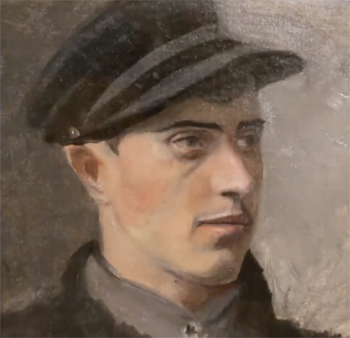In New Orleans, in the mid-1800s, a wealthy merchant, a widower, and his son were known for their rare collection of Old Master paintings, including a Raphael. Often, after dinner, they would sit together and admire them.
for their rare collection of Old Master paintings, including a Raphael. Often, after dinner, they would sit together and admire them.
When the Civil War broke out, the son went away to fight. He was very courageous and died in battle in the Shenandoah Valley while rescuing another soldier. The father was notified and grieved deeply.
A few months later a young man came to the door with a large package. The father answered the bell himself.
‘Sir, you don’t know me,’ the young man said. ‘I am the soldier your son died to save.’
‘Come in! Please come in. Good Lord, tell me all,’ said the father.
They retired to the sitting room. ‘Your son saved many lives that day,’ the soldier began. ‘He was carrying me to safety when a bullet struck him in the heart. He died instantly.’ The young man offered his package. ‘This isn’t much, sir, but your son often talked about you and your love for art. I’m a poor artist but I think he would have wanted you to have it.’
The father tore off the brown paper to find a portrait of his son. He stared in awe at the way the soldier had captured the strong character in his eyes. His own welled up with tears. He thanked the young man and offered to pay him for the picture. ‘Oh, no sir. I could never repay what your son did for me. It’s a gift.’
And so the father took the portrait and hung it over his fireplace. When visitors came, he always took them to see the portrait of his son before he showed them his great masterpieces.
In time the man died and a great auction of his paintings was held in his mansion. Wealthy collectors and museum curators came from New York and Boston, excited and prepared to bid extravagantly on the rare Old Masters. On the platform was an easel with the painting of the son.
The auctioneer rapped his gavel. ‘We will begin with the portrait of the patron’s young son. What am I bid?’
There was a long silence. He tried again. ‘Who will start the bidding?’
A gentleman called out. ‘We’re not here for amateur works! Skip this one and proceed to the fine art!’
But the auctioneer persisted. ‘Do I hear two hundred dollars? One hundred?’
Another voice shouted angrily. ‘We didn’t come all this way to dwell on this inferior painting! Get on with it!’
The auctioneer sighed. ‘Please. Who will take the son?’
A soft voice came from the back of the room. ‘I’ll bid ten dollars, sir. Can’t bid more. It’s all I got.’
It was a black man, a loyal, longtime servant of the deceased father and son.
The auctioneer smiled. ‘I have ten dollars. Who will bid twenty?’
The frustrated crowd was now angry. One yelled. ‘Give it to him for ten and move on!’
‘No further bids for this painting? Going once, twice.’ The auctioneer banged his gavel. ‘Sold to the man in the back for ten dollars.’
The portrait was carted away. No other painting appeared. The auctioneer remained silent.
A man in the front row shouted. ‘Well? Get on with it!’
The auctioneer rested his elbows on his lectern. ‘I’m sorry but the auction is over.’
The entitled crowd erupted in angry expletives.
The auctioneer waited for silence then explained. ‘When I was summoned to conduct this auction, the family lawyer showed me the will and the secret stipulation therein. I was not permitted to reveal that stipulation until this moment. Only the painting of the son will be auctioned.’
Stunned silence was followed by pandemonium. ‘What?’ cried many. ‘This is an outrage!’
The auctioneer wasn’t finished. ‘With the further stipulation that whomever came forth for his son would thereby also receive the mansion, the assets of the estate and the entire collection of Old Master paintings.
“Whoever takes the son gets everything.”
Parable has unknown origins



